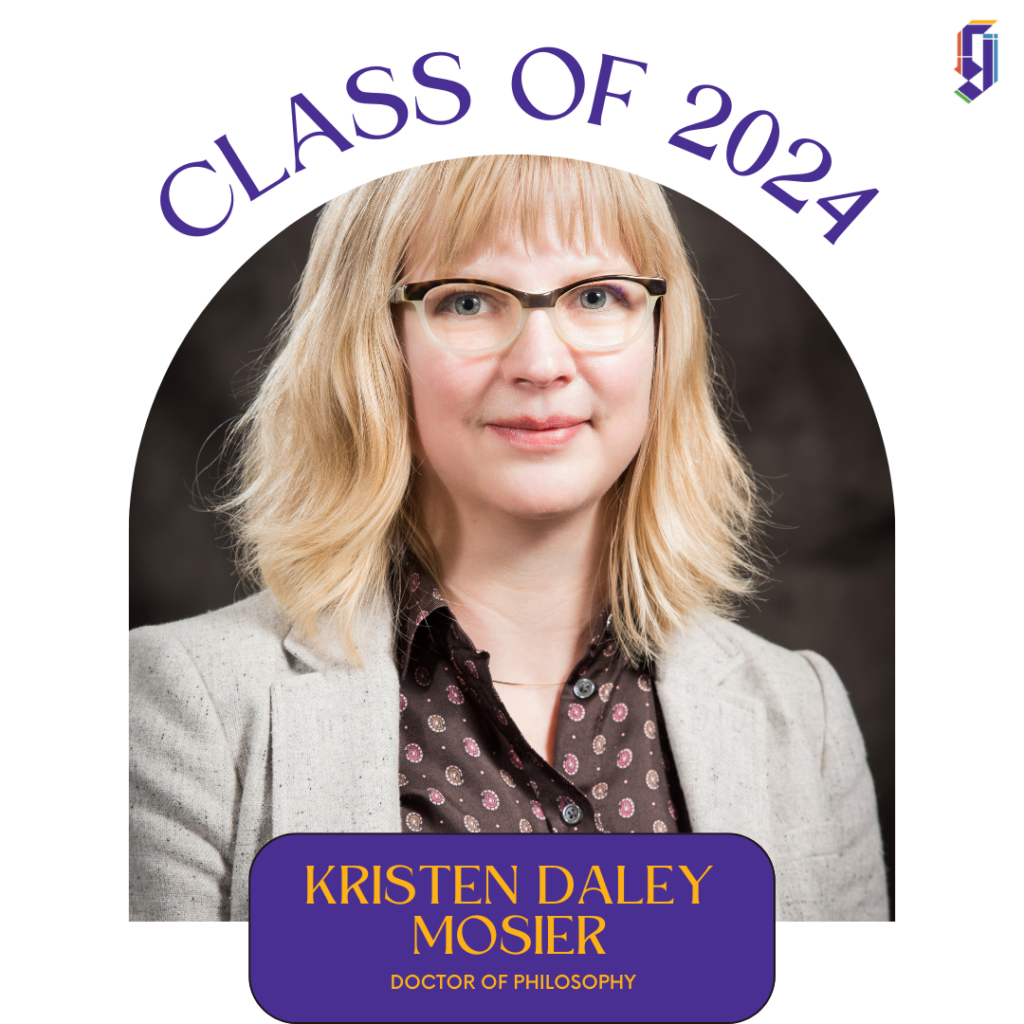Blessed by Water
May 2, 2024
An Interview with Graduating Ph.D. Student Kristen Daley Mosier

We’re familiar with water as an essential and defining feature of baptism, yet few baptismal theologies treat it like an active participant in the sacrament. For the most part, water’s role would only be noteworthy in its absence (while I’ve been in many worships that used different communion elements, I’ve never seen someone get baptized with anything else). For soon-to-be-Dr. Kristen Daley Mosier, however, this oversight disregards the sacredness of water within the ritual and contributes to theologies that diminish its worth in the rest of our lives. “As I was studying baptismal theology, it started to dawn on me that it’s all about water and yet, we’re not talking about particular waters,” the graduating Ph.D. student tells me. “I started to wonder: Why is that? And what happens when we do talk about particular waters?”
To investigate this further, she wrote her dissertation, Led Down into the Streams: a Baptismal Journey through Water and Spirit,” examining baptismal theology through a watershed lens, a process that opened new frontiers for both her understanding of the sacrament and appreciation of our ecological interconnectedness. “The work of Ched Meyers Watershed Discipleship came into play in asking, ‘What role does water play?” she says. “Not just sacramentally, but also ecologically and possibly even subjectively, as we see a shift from thinking of nature as inanimate to considering it through the notion of subjectivity—that we are partnering with water to bring persons into the community of Christ and into the Church.”
While some of these philosophical dimensions may be new, honoring water is not. “The earliest existing treatise we have was written by Tertullian,” she notes. “In it, water has this beautiful, expansive role—at one point he stops himself because he’s been talking about water so much and says, ‘Oh, but I’m not writing a theology of water,’ before I go too far with that let’s return to Jesus.’” In short order, however, the holiness of water was downplayed and diminished. “By the time Ambrose is writing, he’s saying that only water that has been consecrated can be used for baptism,” she explains. “there’s a complete separation of the waters for everyday use and for religious use—a separation we’ve inherited, made worse by the Enlightenment and many of our modern thinkers.”
While there’s nothing wrong with ritual blessing, or consecrating baptismal waters, treating ordinary water as if it were profane carries significant ecological risk. “When we minimize elements of creation within our worship spaces, we risk devaluing them altogether,” Daley Mosier explains. In the Bible, we read that water is present in God’s very act of creation. It is an integral part of creating and sustaining life in a theological sense, in addition to the quite literal one. When governments and/or corporations abuse the watershed, God’s people suffer. And that harm affects the baptismal act, too.
As part of her studies at Garrett, Daley– Mosier worked with Dr. Andrew Wymer to interview pastors in Flint, Michigan about how baptismal practices were impacted by the Flint Water Crisis. “We asked the question: Would you ever consider baptizing using water from the Flint river?” she remembers. “Very quickly they said ‘No,’ and there was usually a bit of a chortle with the ‘No,’” as if the idea of baptizing people in the community’s natural water was absurd. These issues of environmental racism and ecological injustice are too often absent in scholarly work where they should be present. “I’m reading re-wilding conversations and all this ecotheology that says, ‘let’s take our sacraments back outdoors,” she notes. “Then I hear the Flint clergy saying, ‘Our people would never get baptized in the Flint River because it has a storied history of being very unclean.’ It’s haunting.’”
Ultimately part of the work to prevent future water crises is reestablishing relationship with local watersheds. It’s a relationship to which Daley Mosier became increasingly aware throughout this academic journey. “One of the things about doing a watershed-oriented research project is that I realized just how connected I am to my own watershed—it was a primary reason that my spouse and I moved back to Seattle after I did my coursework,” she says. “My dad was a fisheries consultant, and so I grew up checking stream habitat for fish, traipsing along behind him looking for frogs.” A glow spreads across her face alongside the memory, the contentment of someone who hears and knows her call. In addition to working with two local churches, she is connecting with Earth Ministry / Washington Interfaith Power & Light to use her theological training and find ways to serve with them, and others, in advocating for environmental justice. “I know it will be a quilted career,” she says with a smile. “This is what it means to do theology in place.”

